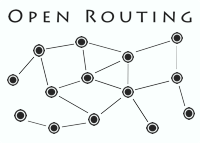Platform - Interactions with HW¶
Introduction¶
Open/R relies on Platform layer to provide the service to program routes( i.e.
Unicast Routes/MPLS Routes) on actual underneath system. Platform must provide
Thrift based service via certain port(e.g. 60100 by default) to receive thrift
client request for route programming. It is the abstract layer, which can be
implemented differently on individual system.
For example:
NetlinkProtocolSocketto program route on Linux platform;Platform-specific agent on vendor device to fulfill SDK call;
NOTE: link information retrieval and interface address programming is done by directly interacting with
NetlinkProtocolSocketvia Linux Kernel Interface.
Inter-Module Communications¶

Thrift APIs¶
Unicast Route APIs¶
/*
* @params: clientId => identify client to program route
* route => single unicast route to be added
* @return: None
*/
void addUnicastRoute(i16 clientId, Network.UnicastRoute route);
/*
* @params: clientId => identify client to program route
* routes => collection of unicast routes to be added
* @return: None
*/
void addUnicastRoutes(i16 clientId, list<Network.UnicastRoute> routes);
/*
* @params: clientId => identify client to delete route
* prefix => single unicast prefix to be deleted
* @return: None
*/
void deleteUnicastRoute(i16 clientId, Network.IpPrefix prefix);
/*
* @params: clientId => identify client to delete route
* prefixes => collection of unicast prefixes to be deleted
* @return: None
*/
void deleteUnicastRoutes(i16 clientId, list<Network.IpPrefix> prefixes);
/*
* @params: clientId => identify client to sync route
* routes => collection of unicast routes to be synced.
* This will flush ALL existing routes and install new one.
* @return: None
*/
void syncFib(i16 clientId, list<Network.UnicastRoute> routes);
/*
* @params: clientId => identify client to fetch route
* @return: a vector of UnicastRoute programmed by this clientId
*/
list<Network.UnicastRoute> getRouteTableByClient(i16 clientId);
MPLS Route APIs¶
/*
* @params: clientId => identify client to program route
* routes => collection of MPLS routes to be added
* @return: None
*/
void addMplsRoutes(i16 clientId, list<Network.MplsRoute> routes);
/*
* @params: clientId => identify client to delete route
* topLabels => collection of MPLS labels to be deleted
* @return: None
*/
void deleteMplsRoutes(i16 clientId, list<i32> topLabels);
/*
* @params: clientId => identify client to sync route
* routes => collection of MPLS routes to be synced. This
* will flush ALL existing routes and install new one.
* @return: None
*/
void syncMplsFib(i16 clientId, list<Network.MplsRoute> routes);
/*
* @params: clientId => identify client to fetch route
* @return: a vector of MplsRoute programmed by this clientId
*/
list<Network.MplsRoute> getMplsRouteTableByClient(i16 clientId);
For more information, checkout
Deep Dive¶
Support on Linux Platform¶
NetlinkFibHandler provides thrift service interface for on-box client modules
(i.e. Fib) to program routes through Linux Kernel Interface. Client dispatches
thrift call to update routes or get full route table from Platform. Client can
periodically synchronize with service by keep alive check call, a re-sync
request is supported by the handler to re-send routing information upon client
restart.
Support on other Platform¶
To support platform other than Linux, developers should implement the thrift service APIs in if/Platform.thrift
